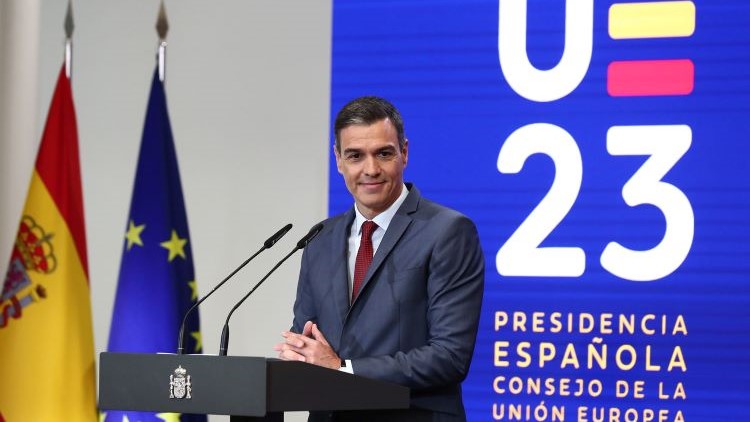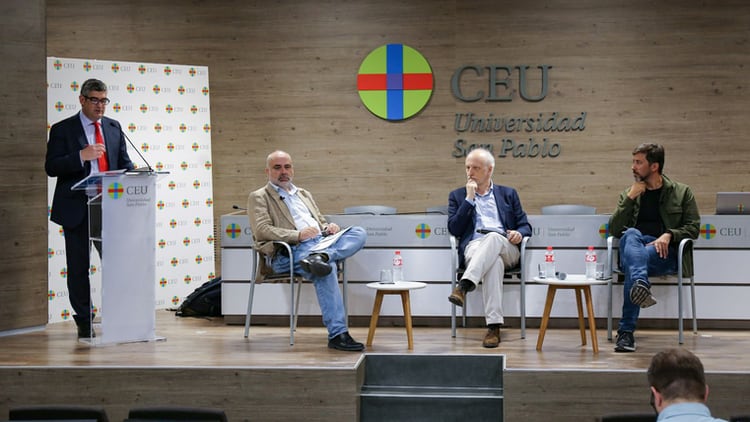The Diplomat
The President of the Government, Pedro Sánchez, announced yesterday that the main priorities of the Spanish Presidency of the EU will be the reindustrialization of Europe, the ecological transition, the consolidation of the social pillar and the reinforcement of the unity of the EU “so that it becomes a pillar of the new world order”. However, he declined to clarify whether he plans to meet with the leader of the PP, Alberto Núñez Feijóo, to address these issues.
Sánchez reported on the priorities of the Presidency during a press conference in the Barceló Hall of the presidential complex of La Moncloa, reserved for major occasions, accompanied by the Second Vice-President, Yolanda Díaz; the Third Vice-President, Teresa Ribera; the Minister of Foreign Affairs, José Manuel Albares; the Minister of the Presidency, Félix Bolaños; and the Spokesperson and Minister of Territorial Policy, Isabel Rodríguez.
According to Sánchez, Spain assumes the Presidency “with gratitude and humility, but also with ambition, to make ourselves useful for people’s lives”. “We have been working on this for many months,” she assured. “We have worked with all the actors, and democracy is never a problem,” he added, in response to a question about the early general elections on July 23 and the consequent change (partial or total) of the Government in the middle of the European Presidency. Feijóo has repeatedly accused the Government of not keeping him informed on these issues and has even assured that he has more information on the current Swedish Presidency than on the upcoming Spanish Presidency, which begins on July 1.
In this regard, and when asked by the press whether he plans to talk to Feijóo about the European Presidency and even whether there is a specific protocol to transfer these matters to the leader of the PP in the event of an electoral upset, Pedro Sánchez chose to avoid any specific answer: “You must also understand that the rotating Presidency of the Council of the European Union places Spain as a bridge-building actor to try to move forward files that are already underway”, files that “we do not impose from Spain, but that are already being processed in Europe”, he affirmed.
Among the dossiers, he said, include “from the immigration and asylum pact, to everything that has to do with digital platforms and workers’ rights, and even countless dossiers that, from Spain, have to be given that impetus to be able to close them as soon as possible in the second half of the year”. “I insist: our role as rotating Presidency of the Council of the European Union is not to impose dossiers or debates, but to guide these debates and these existing dossiers so that they reach a successful conclusion”, he added.
Priorities
With regard to the main priorities of the Spanish semester, Pedro Sánchez announced four: reindustrializing the EU and guaranteeing its open strategic autonomy, advancing in the ecological transition and environmental adaptation, promoting greater social and economic justice and strengthening European unity.
Regarding reindustrialization, Sánchez warned of the need to “find new ways to move Europe away from situations of excessive dependence on third countries in crucial areas such as energy, health, digital technologies and food”. For this reason, he assured that the Spanish Presidency will work in “the coming months” to make progress towards an open strategic autonomy on two fronts: the development of strategic industries and technologies in Europe and the diversification of trade relations, with special attention to Latin America and the EU-CELAC Summit.
With regard to the ecological transition, the President of the Government warned that halting climate change and environmental degradation “will enable us to drastically reduce our dependence on raw materials for energy, thus reducing our electricity bill and making European companies more competitive”. To this end, he assured that during the Spanish Presidency, a reform of the electricity market will be promoted to accelerate the deployment of renewables, reduce electricity prices and improve the stability of the system.
On the other hand, Sánchez assured that the consolidation of the Social Pillar and, therefore, “achieving greater social and economic justice”, occupies “a key place among the Presidency’s priorities” and that, therefore, Spain will advocate the establishment of “minimum and common standards of corporate taxation in all Member States” and will combat tax evasion by large multinationals, “an evasion that costs Europe 1.5 points of GDP every year, that is, the same as it invests in building public housing and protecting the environment”. In this regard, Spain will prioritize the “appropriate revision of the Multiannual Financial Framework 2021-2027”, and will work “to achieve a reform of the fiscal rules that will put an end to the austerity policies that did so much damage during the financial crisis of 2008”.
As for the fourth priority, strengthening European unity, Pedro Sánchez warned that, “in a world of giants, the EU must remain united if we want it to be an architect of the new international order”. For this reason, he assured, Spain will promote “an optimization in the decision-making process, in the strategic agenda and the migration and asylum pact” and will advocate for “a greater deepening of the internal market, the completion of the banking union and the capital markets union” and for the improvement and consolidation of common instruments, such as the NextGeneration funds. President Sánchez also stressed that this priority also includes coordinated support for Ukraine and “other neighboring states”.
Pedro Sánchez also took the opportunity to leak some opinions on domestic policy, especially after the pact between PP and Vox in the Valencian Community, despite the resolution issued this past Wednesday by the Central Electoral Board (JEC) in which it warned him, in the words of the president himself, that “in acts like this we should not say certain things”. According to the head of the Executive, the increase in the representation of “anti-European” political formations is “bad news in the European Union as a whole”. “If we have learned anything, first with the pandemic and then with the war in Ukraine, it is that what we have to do, to be stronger, is to unite,” he proclaimed.







